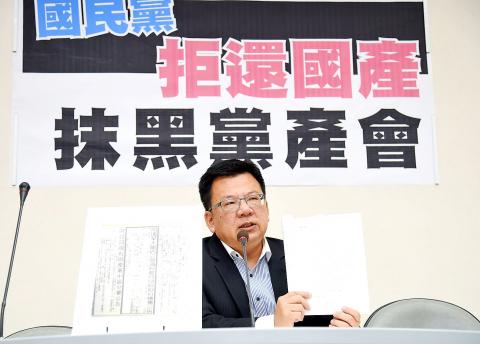The Executive Yuan’s Ill-gotten Party Assets Settlement Committee yesterday rejected Chinese Nationalist Party (KMT) lawmakers’ accusations that its field investigation into the party’s investment in a Palauan hotel had become a tourist trip.
At a morning news conference in Taipei yesterday, KMT caucus secretary-general William Tseng (曾銘宗) said that two committee employees took a four-day trip to Palau — one of Taiwan’s diplomatic allies — in August last year to inspect the Palasia Hotel Palau, of which the KMT-controlled Central Investment Co and its subsidiary own 80 percent.
“However, the 70-plus page trip report submitted by the committee talked about diplomacy and tourism, which are not even remotely related to its duties,” Tseng said, adding that most of the report’s content were pictures and appendixes, and that not a single word in its half-page of feedback and suggestions was about the committee’s actual work.

Photo: Huang Yao-cheng, Taipei Times
The report raised questions about the “credibility of the committee’s future decisions,” as it was the main document on which the committee based its rejection of the company’s request to sell the hotel, Tseng said.
He said if the committee refuses to apologize, he would confront Premier Su Tseng-chang (蘇貞昌) at the next legislative session and ask him if he would accept such a sloppy report.
KMT Legislator Tung Hui-chen (童惠珍) said that the report served as proof that the committee was established by the Democratic Progressive Party for the mere purpose of bringing down the KMT.
Shortly after the news conference, committee spokeswoman Shih Chin-fang (施錦芳) rejected the KMT lawmakers’ allegations, saying that the purpose of the trip was to inspect the KMT’s overseas assets, not sightseeing.
The committee decided to take the trip after Central Investment criticized it for rejecting the firm’s request to sell the hotel without first sending someone to inspect it, Shih said.
Committee staff made the trip along with representatives from Central Investment, Shih said, adding that they did not have any set plans for the first day, and met with Palauan Bureau of Tourism officials, tourism proprietors and representatives of the Palasia Hotel Palau on the second day.
On the third day, they met with Taiwan’s overseas government staff and agricultural enterprises, before attending a banquet in the afternoon celebrating the 20th anniversary of the Palasia Hotel Palau’s establishment to investigate the hotel’s operations, Shih said.
The portion about tourism in the committee’s report mostly concerned committee staff’s meetings with the Palauan Bureau of Tourism’s director and the Palasia Hotel Palau’s general manager, she said.
The celebratory banquet was also attended by Palauan Vice President Raynold Oilouch and Central Investment chairman Gordon Chen (陳樹), she added.

Alain Robert, known as the "French Spider-Man," praised Alex Honnold as exceptionally well-prepared after the US climber completed a free solo ascent of Taipei 101 yesterday. Robert said Honnold's ascent of the 508m-tall skyscraper in just more than one-and-a-half hours without using safety ropes or equipment was a remarkable achievement. "This is my life," he said in an interview conducted in French, adding that he liked the feeling of being "on the edge of danger." The 63-year-old Frenchman climbed Taipei 101 using ropes in December 2004, taking about four hours to reach the top. On a one-to-10 scale of difficulty, Robert said Taipei 101

Nipah virus infection is to be officially listed as a category 5 notifiable infectious disease in Taiwan in March, while clinical treatment guidelines are being formulated, the Centers for Disease Control (CDC) said yesterday. With Nipah infections being reported in other countries and considering its relatively high fatality rate, the centers on Jan. 16 announced that it would be listed as a notifiable infectious disease to bolster the nation’s systematic early warning system and increase public awareness, the CDC said. Bangladesh reported four fatal cases last year in separate districts, with three linked to raw date palm sap consumption, CDC Epidemic Intelligence

Taiwanese and US defense groups are collaborating to introduce deployable, semi-autonomous manufacturing systems for drones and components in a boost to the nation’s supply chain resilience. Taiwan’s G-Tech Optroelectronics Corp subsidiary GTOC and the US’ Aerkomm Inc on Friday announced an agreement with fellow US-based Firestorm Lab to adopt the latter’s xCell, a technology featuring 3D printers fitted in 6.1m container units. The systems enable aerial platforms and parts to be produced in high volumes from dispersed nodes capable of rapid redeployment, to minimize the risk of enemy strikes and to meet field requirements, they said. Firestorm chief technology officer Ian Muceus said

MORE FALL: An investigation into one of Xi’s key cronies, part of a broader ‘anti-corruption’ drive, indicates that he might have a deep distrust in the military, an expert said China’s latest military purge underscores systemic risks in its shift from collective leadership to sole rule under Chinese President Xi Jinping (習近平), and could disrupt its chain of command and military capabilities, a national security official said yesterday. If decisionmaking within the Chinese Communist Party has become “irrational” under one-man rule, the Taiwan Strait and the regional situation must be approached with extreme caution, given unforeseen risks, they added. The anonymous official made the remarks as China’s Central Military Commission Vice Chairman Zhang Youxia (張又俠) and Joint Staff Department Chief of Staff Liu Zhenli (劉振立) were reportedly being investigated for suspected “serious